牛津译林版8A unit2 School life Grammar 课件
文档属性
| 名称 | 牛津译林版8A unit2 School life Grammar 课件 | 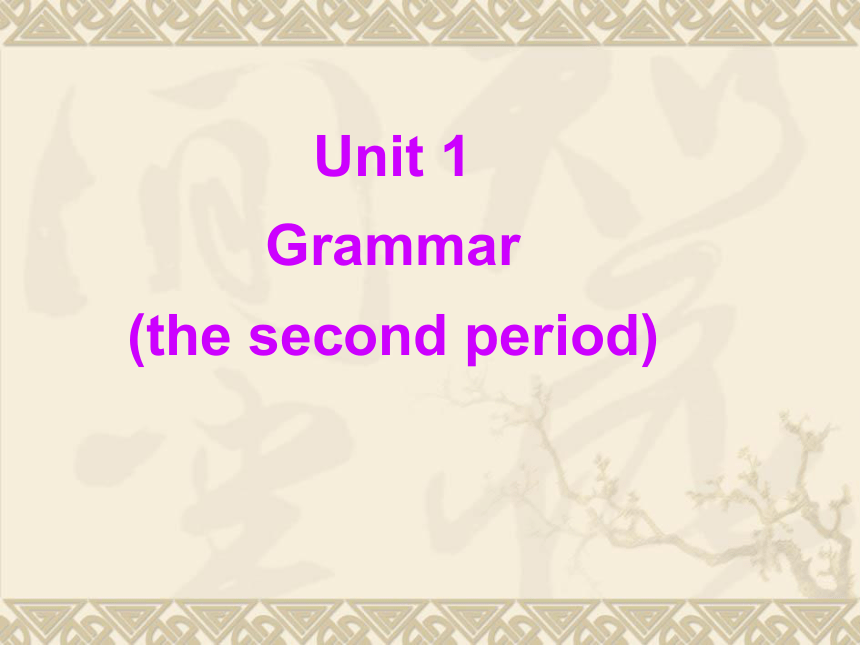 | |
| 格式 | zip | ||
| 文件大小 | 708.1KB | ||
| 资源类型 | 教案 | ||
| 版本资源 | 牛津译林版 | ||
| 科目 | 英语 | ||
| 更新时间 | 2012-09-28 14:29:28 | ||
图片预览

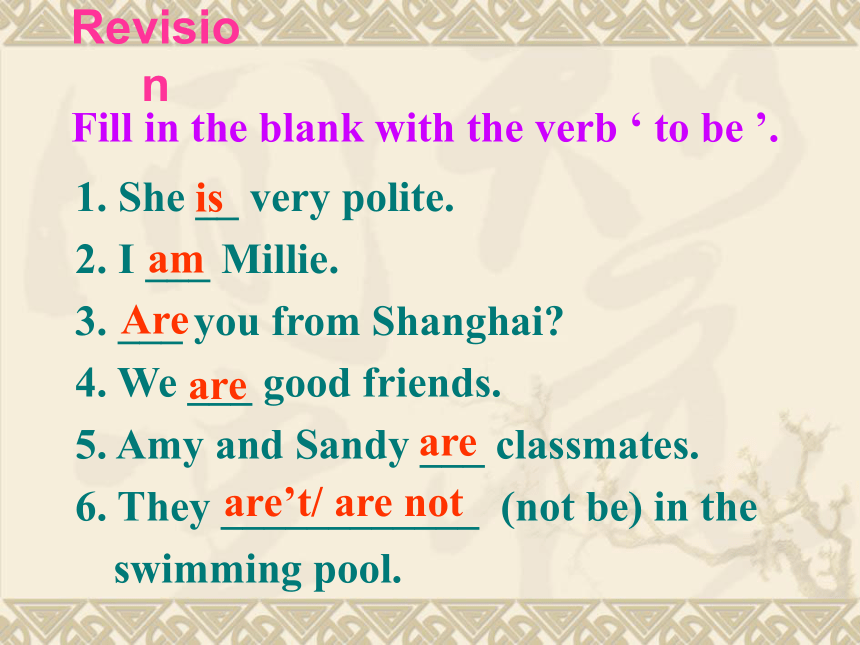
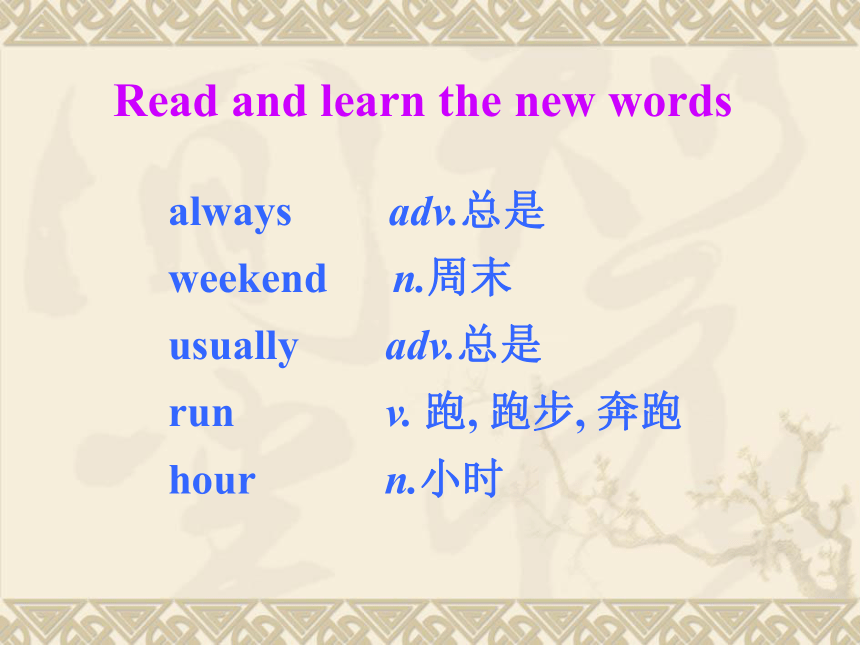
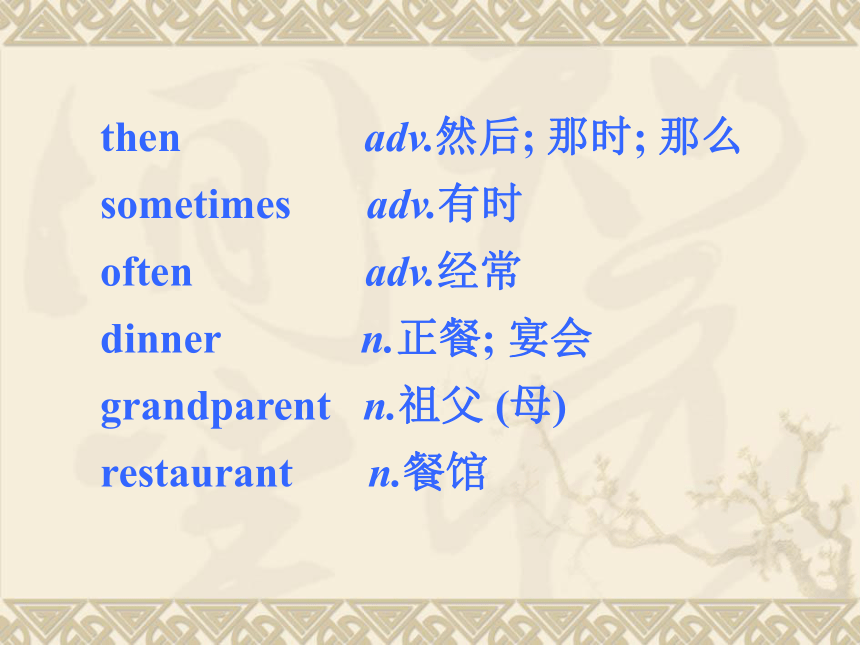
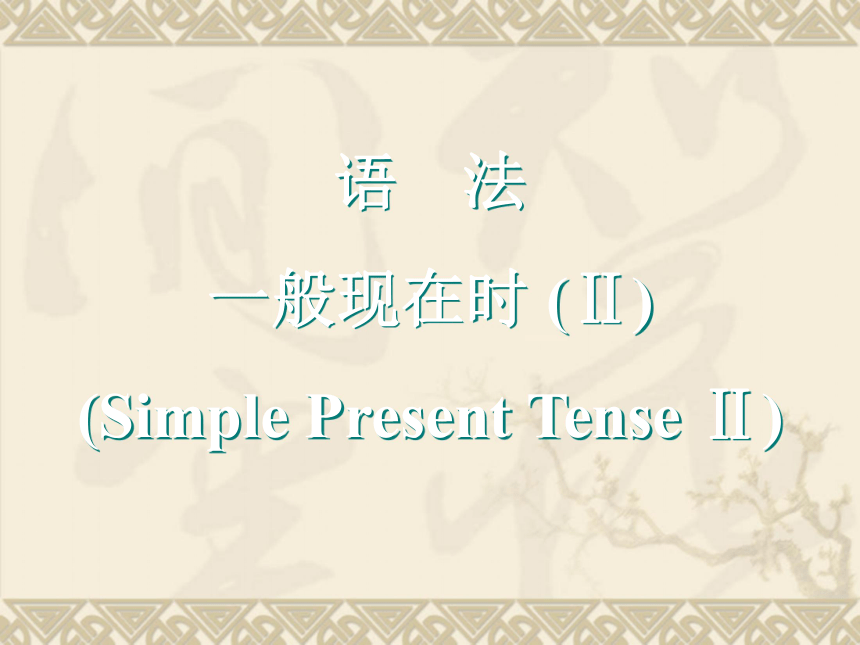
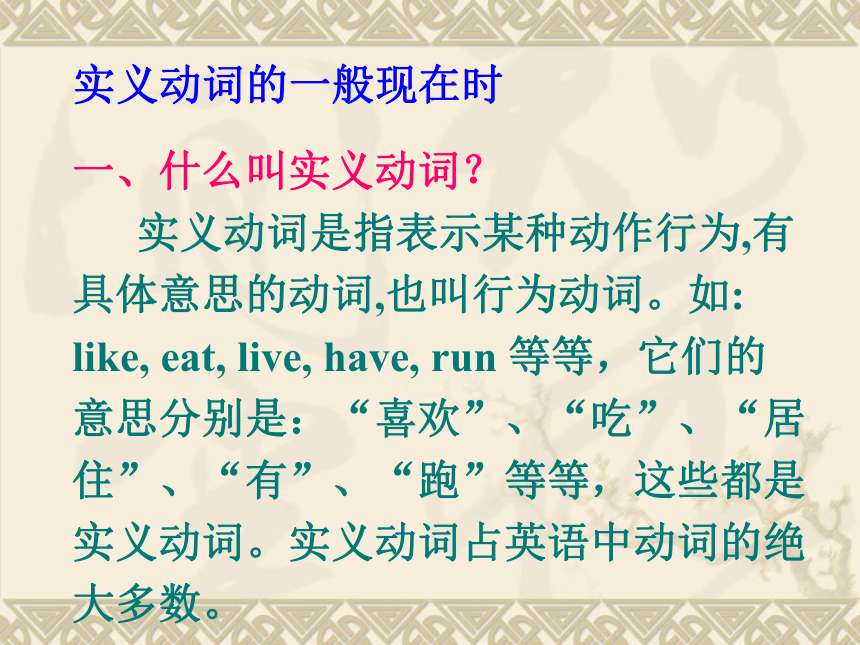
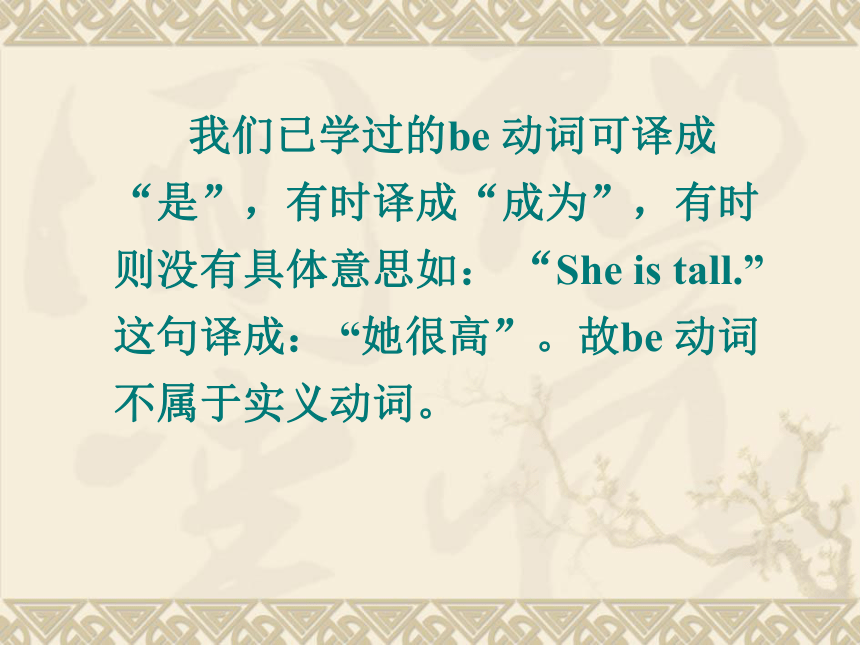
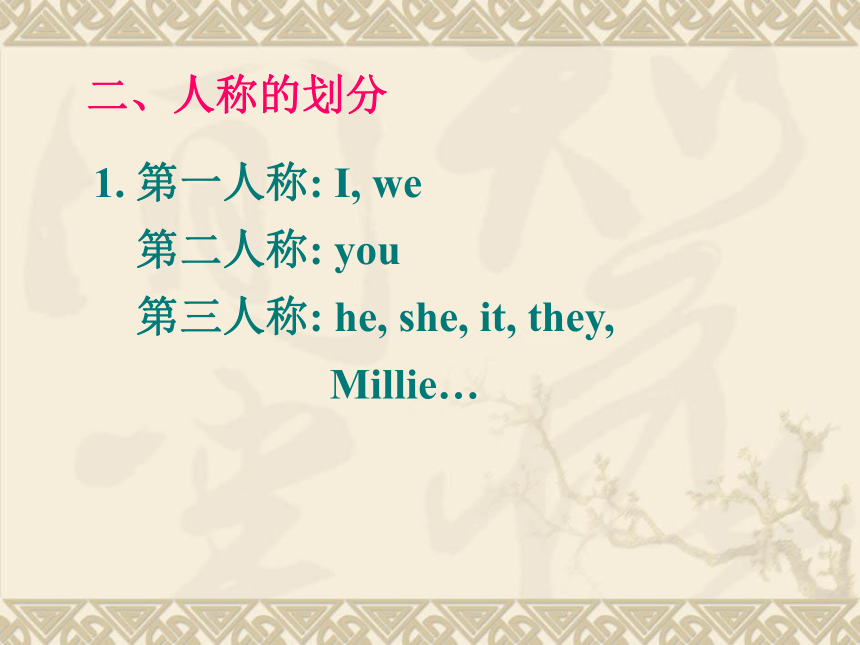
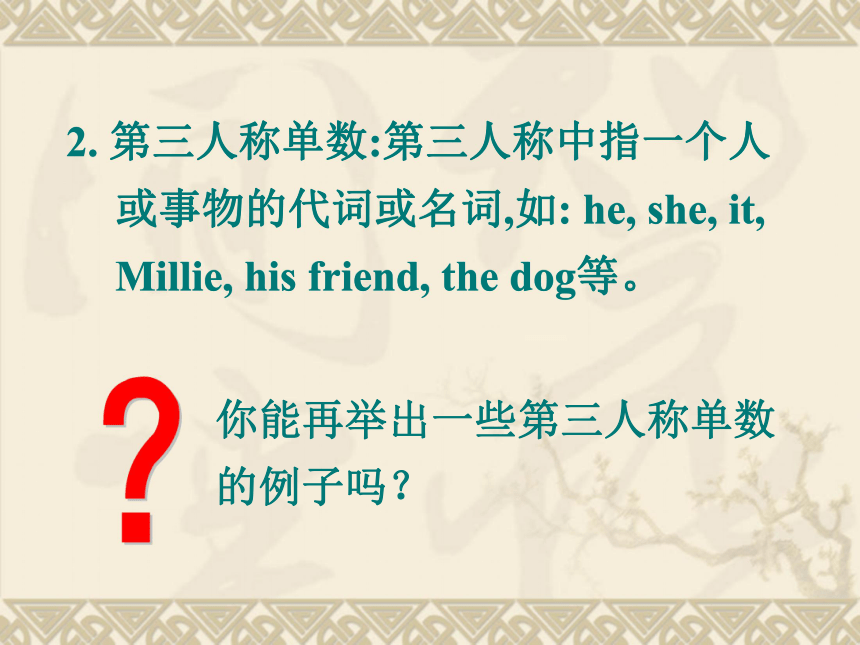
文档简介
(共28张PPT)
Unit 1
Grammar
(the second period)
Revision
Fill in the blank with the verb ‘ to be ’.
1. She __ very polite.
2. I ___ Millie.
3. ___ you from Shanghai
4. We ___ good friends.
5. Amy and Sandy ___ classmates.
6. They ____________ (not be) in the swimming pool.
is
am
Are
are
are
are’t/ are not
Read and learn the new words
always adv.总是
weekend n.周末
usually adv.总是
run v. 跑, 跑步, 奔跑
hour n.小时
then adv.然后; 那时; 那么
sometimes adv.有时
often adv.经常
dinner n.正餐; 宴会
grandparent n.祖父 (母)
restaurant n.餐馆
语 法
一般现在时 (Ⅱ)
(Simple Present Tense Ⅱ)
实义动词的一般现在时
一、什么叫实义动词?
实义动词是指表示某种动作行为,有具体意思的动词,也叫行为动词。如: like, eat, live, have, run 等等,它们的意思分别是:“喜欢”、“吃”、“居住”、“有”、“跑”等等,这些都是实义动词。实义动词占英语中动词的绝大多数。
我们已学过的be 动词可译成“是”,有时译成“成为”,有时则没有具体意思如: “She is tall.”这句译成: “她很高”。故be 动词不属于实义动词。
二、人称的划分
1. 第一人称: I, we
第二人称: you
第三人称: he, she, it, they, Millie…
2. 第三人称单数:第三人称中指一个人或事物的代词或名词,如: he, she, it, Millie, his friend, the dog等。
你能再举出一些第三人称单数的例子吗?
三、 一般现在时实义动词作谓语时
的动词形式:
一般现在时实义动词作谓语时的动词形式有两种:动词原形或第三人称单数动词形式(如: enjoy叫原形, enjoys叫第三人称单数形式)。
四、实义动词第三人称单数的动词形
式变化规则:
绝大多数动词 +s walk—walks
辅音字母+y结尾的动词 将y改为i+es fly—flies
以s, x, ch, sh 结尾的动词 +es watch—watches
一些以o结尾的动词 +es go—goes
do—does
1. 肯定句:
(1) 第三人称单数主语+第三人称单数的谓语动词+……
He enjoys playing football.
(2) 其他人称的主语+动词原形+……
I like my school very much.
五、实义动词的一般现在时的各种句型。
2. 否定句:
(1) 第三人称单数主语+does not 或doesn’t +动词原形+……
He doesn’t enjoy playing football.
(2) 其他人称的主语+don’t +动词原形+……
I don’t like swimming.
3. 一般疑问句及其肯、否定回答:
(1) Does +第三人称单数主语+动词原形+……
肯定回答: Yes, +第三人称单数的代词+does.
否定回答: No, + 第三人称单数的代词+ doesn’t/ does not.
Does he enjoy football
Yes, he does.
No, he doesn’t/does not.
(2) Do +其他人称的主语+动词原形+……
肯定回答: Yes, + 其他人称的代词+do.
否定回答: No, +其他人称的代词+don’t / do not.
Do they come from Guangdong
Yes, they do.
No, they don’t / do not.
缩写形式小结:
doesn’t = does not
don’t = do not
谓语动词是实义动词时, 其一般现在时的谓语动词形式有两种——第三人称单数或原形。其否定句和疑问句要借助于does或do来帮助构成。
实义动词的一般现在时用法小结
Complete Part B, Part C on page 14 , and Part D on page 15.
Part E Simon is writing to his penfriend about what he and his family do at the weekend. Help him complete his letter. Use the simple present tense of the verbs in brackets.
Dear David,
At the weekend, I usually __ (go) running for half and hour. Then I ____ (play) football. My mother ____________ (not watch) our games but my father _______ (watch) them. I ___ (be) good at football. ___ (be) you good at football Sometimes my mother ___ (fly) a kite with me in the park.
go
play
doesn’t watch
watches
am
Are
flies
In the evenings, we often ____ (have) dinner at my grandparents’ home. Sometimes, we ___ (eat) in a restaurant.
Write soon!
Simon
have
eat
Useful expressions
Maths teacher 数学老师
at the weekend 在周末
4. be good at … 擅长……
5. half an hour 半小时
6. go swimming/ running 去游泳/ 去跑步
7. watch games 观看比赛
8. in the evening 在晚上
9. have dinner 吃饭
10. have breakfast 吃早饭
in a restaurant 在饭店
12. at lunchtime 吃午饭时
按要求转换句型:
Daniel is very tall. (变成一般疑问句并作肯、否定回答)
Is Daniel very tall
Yes, he is.
No, he isn’t. (No, he is not.)
中考题型链接
2. Kitty and Amy are classmates. (变成否定句)
Kitty and Amy aren’t ( are not) classmates.
3. He wears glasses. (变成一般疑问句并作肯、否定回答)
Does he wear glasses
Yes, he does.
No, he doesn’t (No, he does not.)
4. They enjoy playing football. (变成否定句)
They don’t enjoy playing football.
5. Millie loves playing basketball. (变成否定句)
Millie doesn’t (does not ) love playing basketball.
1. Remember the grammar and the new words in the lesson.
2. Preview the next lesson.
Homework
Unit 1
Grammar
(the second period)
Revision
Fill in the blank with the verb ‘ to be ’.
1. She __ very polite.
2. I ___ Millie.
3. ___ you from Shanghai
4. We ___ good friends.
5. Amy and Sandy ___ classmates.
6. They ____________ (not be) in the swimming pool.
is
am
Are
are
are
are’t/ are not
Read and learn the new words
always adv.总是
weekend n.周末
usually adv.总是
run v. 跑, 跑步, 奔跑
hour n.小时
then adv.然后; 那时; 那么
sometimes adv.有时
often adv.经常
dinner n.正餐; 宴会
grandparent n.祖父 (母)
restaurant n.餐馆
语 法
一般现在时 (Ⅱ)
(Simple Present Tense Ⅱ)
实义动词的一般现在时
一、什么叫实义动词?
实义动词是指表示某种动作行为,有具体意思的动词,也叫行为动词。如: like, eat, live, have, run 等等,它们的意思分别是:“喜欢”、“吃”、“居住”、“有”、“跑”等等,这些都是实义动词。实义动词占英语中动词的绝大多数。
我们已学过的be 动词可译成“是”,有时译成“成为”,有时则没有具体意思如: “She is tall.”这句译成: “她很高”。故be 动词不属于实义动词。
二、人称的划分
1. 第一人称: I, we
第二人称: you
第三人称: he, she, it, they, Millie…
2. 第三人称单数:第三人称中指一个人或事物的代词或名词,如: he, she, it, Millie, his friend, the dog等。
你能再举出一些第三人称单数的例子吗?
三、 一般现在时实义动词作谓语时
的动词形式:
一般现在时实义动词作谓语时的动词形式有两种:动词原形或第三人称单数动词形式(如: enjoy叫原形, enjoys叫第三人称单数形式)。
四、实义动词第三人称单数的动词形
式变化规则:
绝大多数动词 +s walk—walks
辅音字母+y结尾的动词 将y改为i+es fly—flies
以s, x, ch, sh 结尾的动词 +es watch—watches
一些以o结尾的动词 +es go—goes
do—does
1. 肯定句:
(1) 第三人称单数主语+第三人称单数的谓语动词+……
He enjoys playing football.
(2) 其他人称的主语+动词原形+……
I like my school very much.
五、实义动词的一般现在时的各种句型。
2. 否定句:
(1) 第三人称单数主语+does not 或doesn’t +动词原形+……
He doesn’t enjoy playing football.
(2) 其他人称的主语+don’t +动词原形+……
I don’t like swimming.
3. 一般疑问句及其肯、否定回答:
(1) Does +第三人称单数主语+动词原形+……
肯定回答: Yes, +第三人称单数的代词+does.
否定回答: No, + 第三人称单数的代词+ doesn’t/ does not.
Does he enjoy football
Yes, he does.
No, he doesn’t/does not.
(2) Do +其他人称的主语+动词原形+……
肯定回答: Yes, + 其他人称的代词+do.
否定回答: No, +其他人称的代词+don’t / do not.
Do they come from Guangdong
Yes, they do.
No, they don’t / do not.
缩写形式小结:
doesn’t = does not
don’t = do not
谓语动词是实义动词时, 其一般现在时的谓语动词形式有两种——第三人称单数或原形。其否定句和疑问句要借助于does或do来帮助构成。
实义动词的一般现在时用法小结
Complete Part B, Part C on page 14 , and Part D on page 15.
Part E Simon is writing to his penfriend about what he and his family do at the weekend. Help him complete his letter. Use the simple present tense of the verbs in brackets.
Dear David,
At the weekend, I usually __ (go) running for half and hour. Then I ____ (play) football. My mother ____________ (not watch) our games but my father _______ (watch) them. I ___ (be) good at football. ___ (be) you good at football Sometimes my mother ___ (fly) a kite with me in the park.
go
play
doesn’t watch
watches
am
Are
flies
In the evenings, we often ____ (have) dinner at my grandparents’ home. Sometimes, we ___ (eat) in a restaurant.
Write soon!
Simon
have
eat
Useful expressions
Maths teacher 数学老师
at the weekend 在周末
4. be good at … 擅长……
5. half an hour 半小时
6. go swimming/ running 去游泳/ 去跑步
7. watch games 观看比赛
8. in the evening 在晚上
9. have dinner 吃饭
10. have breakfast 吃早饭
in a restaurant 在饭店
12. at lunchtime 吃午饭时
按要求转换句型:
Daniel is very tall. (变成一般疑问句并作肯、否定回答)
Is Daniel very tall
Yes, he is.
No, he isn’t. (No, he is not.)
中考题型链接
2. Kitty and Amy are classmates. (变成否定句)
Kitty and Amy aren’t ( are not) classmates.
3. He wears glasses. (变成一般疑问句并作肯、否定回答)
Does he wear glasses
Yes, he does.
No, he doesn’t (No, he does not.)
4. They enjoy playing football. (变成否定句)
They don’t enjoy playing football.
5. Millie loves playing basketball. (变成否定句)
Millie doesn’t (does not ) love playing basketball.
1. Remember the grammar and the new words in the lesson.
2. Preview the next lesson.
Homework
